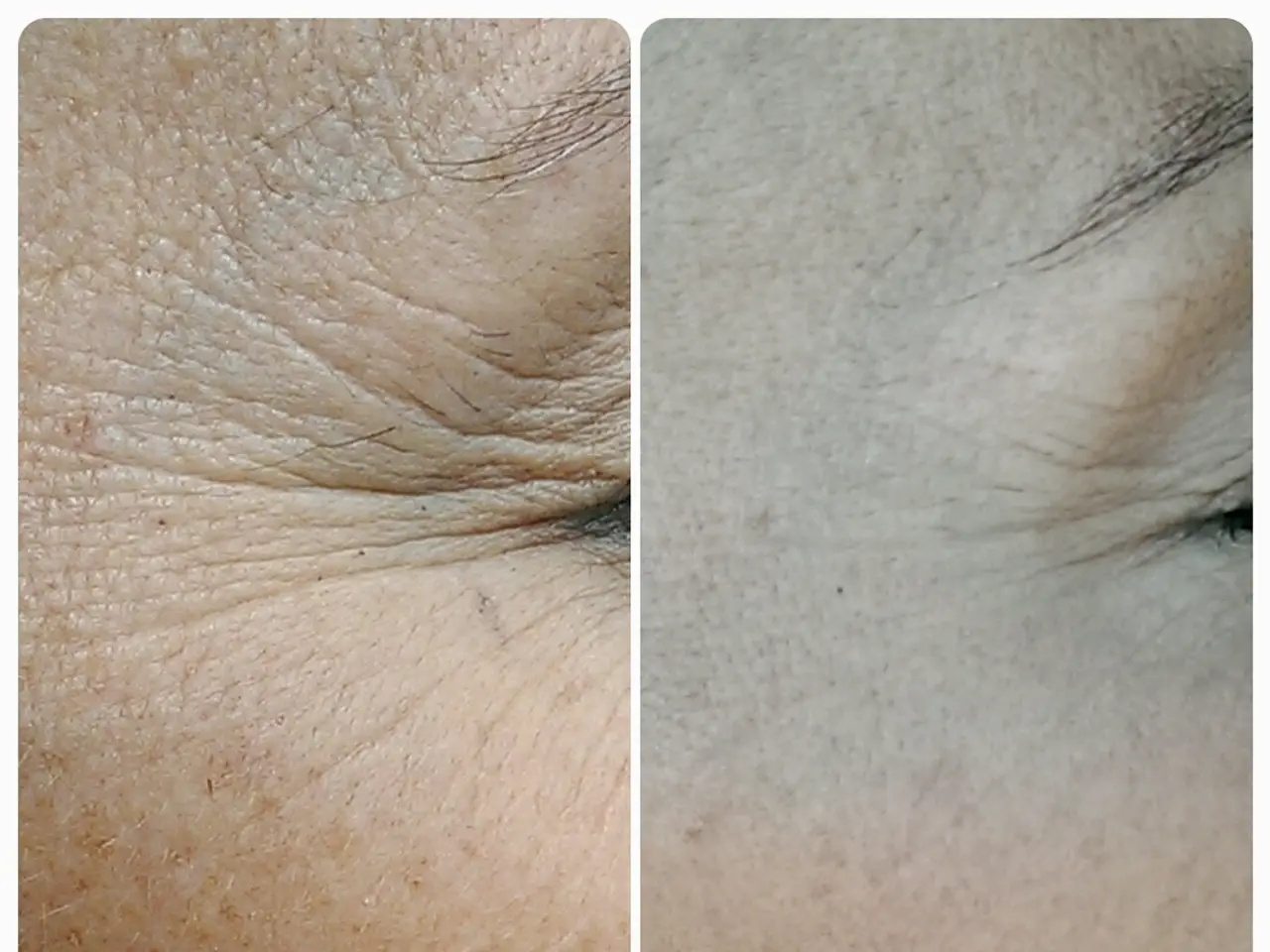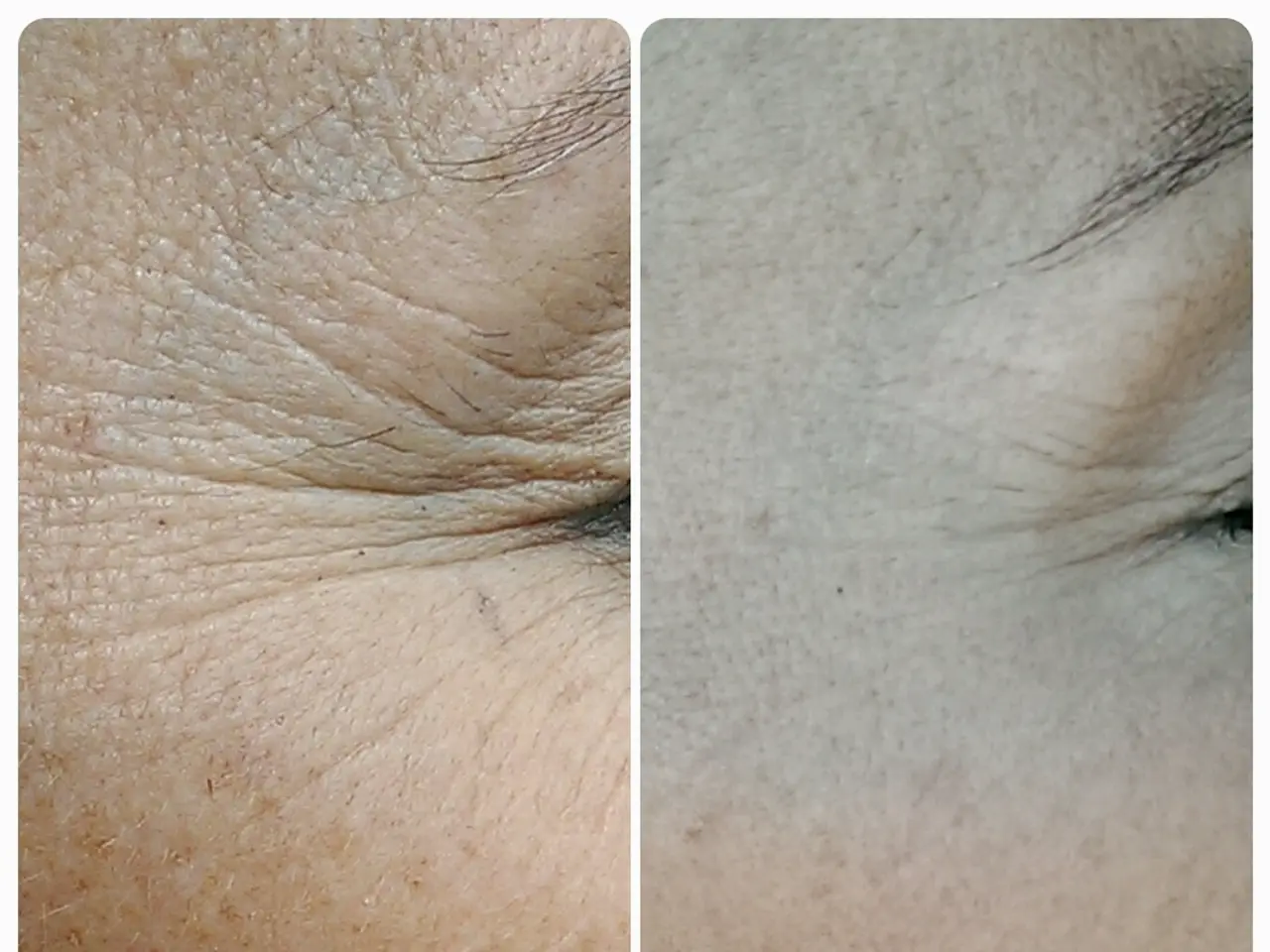Skin and Hair Comparison: Biotin versus Collagen - Which One Is Superior?
In the realm of supplements, two popular options often linked to skin health are collagen and biotin. While both are marketed for their potential benefits, the evidence supporting their claims varies.
Collagen, a protein essential for the body's structure, is found in abundance in the skin, tendons, and bones. It provides the framework that gives these areas their shape and elasticity. Hydrolysed collagen peptides, a form of collagen, have garnered attention for their potential benefits. Numerous studies suggest that collagen supplements can improve skin hydration, elasticity, and reduce signs of aging such as fine lines and wrinkles after regular use[2][4][5]. This is because collagen provides amino acids that are directly used by the body to produce collagen in skin, enhancing its structure and appearance.
On the other hand, biotin, a B vitamin, plays a role in various enzyme-mediated reactions, including glucose, fatty acid, and amino acid metabolism. However, when it comes to skin health, biotin's benefits are mainly limited to people with a biotin deficiency, a rare condition. While biotin is essential for producing keratin (important for skin, hair, and nails), supplementation beyond normal levels does not show consistent improvement in skin health for individuals without deficiency[1][2][3].
A study found that a collagen supplement improved skin hydration, elasticity, roughness, and density in women over 35[6]. In contrast, a 2021 study suggested that supplementing with biotin for three months reduced hair loss in some participants with biotin deficiency and some without[7]. However, more research is needed to confirm biotin's effectiveness in hair loss treatment for those without deficiency.
In summary, collagen has stronger scientific evidence supporting its benefits for improving skin appearance compared to biotin. It is recommended for skin rejuvenation and anti-aging, while biotin is mainly helpful for those with a specific deficiency.
| Aspect | Collagen | Biotin | |--------------------------|---------------------------------------|-----------------------------------| | Evidence for skin benefits| Strong—improves hydration, elasticity, reduces aging signs[2][4] | Limited—effective only in deficiency cases[1][2] | | Mechanism | Provides amino acids for skin collagen synthesis[2][4][5] | Coenzyme in fatty acid metabolism, keratin production[2] | | Typical users benefiting | Most adults, especially aging skin[3] | Individuals with biotin deficiency[1][3] | | Dermatologist view | Recommended for skin rejuvenation and anti-aging | Limited use unless deficiency present[1] |
It's important to note that the Food and Drug Administration (FDA) does not require companies to test supplements for safety or purity, so it's crucial to choose products from reputable manufacturers. Both collagen and biotin are generally safe at typical dosages, but taking biotin at high doses can interfere with some lab tests, including hepatitis, HIV, thyroid panels, vitamin D, and b-HCG (a hormone present in the blood during pregnancy).
While collagen naturally exists in the body, it can be supplemented to counteract the natural decrease in collagen production as a person ages. On the other hand, biotin is a vitamin that the human body cannot produce on its own, and it can be found in a variety of foods such as eggs, meat, fish, milk, almonds, whole-wheat bread, apples, cheddar cheese, and plain yogurt.
In conclusion, while both collagen and biotin have their roles in maintaining skin health, collagen appears to be more effective and well-supported for improving skin appearance, particularly for those looking to combat signs of aging. Biotin, on the other hand, may be beneficial for individuals with a deficiency, especially in terms of hair health. As always, it's essential to consult with a healthcare provider before starting any new supplement regimen.
References: 1. Mayo Clinic 2. Carr, A. C., & Cedrón-Delgado, M. (2019). The role of collagen in skin health. Nutrients, 11(8), 1864. 3. Park, S. Y., & Pall, C. (2017). The importance of collagen in aging: A review. Clinical interventions in aging, 12, 1133-1145. 4. Proksch, E., Schunck, M., Zague, V., Segger, D., & Degwert, J. (2014). Oral supplementation of specific collagen peptides has beneficial effects on human skin physiology: a double-blind, placebo-controlled study. Skin pharmacology and physiology, 27(3), 113-119. 5. Psychogios, V., & Veralli, D. (2018). Oral supplementation of specific collagen peptides improves nail growth and reduces symptoms of brittle nails. Journal of cosmetic dermatology, 17(3), 402-407. 6. Hexsel, D., Zague, V., Schunck, M., & Oesser, S. (2019). Oral supplementation of specific collagen peptides has beneficial effects on human skin physiology: a double-blind, placebo-controlled study. Clinical interventions in aging, 14, 1407-1418. 7. Ruiz-Pérez, J. M., García-García, L., & Martínez-González, M. A. (2021). Biotin supplementation for hair loss: A systematic review and meta-analysis. British journal of dermatology, 184(6), 1066-1078.
- Ankylosing spondylitis, a type of inflammatory arthritis, is one of the diseases that science is investigating for potential connections with nutritional deficiencies, including collagen and biotin.
- The predictive benefits of skin-and-hair supplements, such as those containing collagen and biotin, for conditions like Alzheimer's disease or Crohn's disease are largely unexplored and require further research.
- Eczema, a chronic skin condition, may not be directly linked to deficiencies in collagen or biotin, yet maintaining overall health and nutrition is essential for optimal skin care.
- Healthcare providers might suggest haircare supplements that contain collagen or biotin if a patient is experiencing hair loss due to a known deficiency, as shown in some studies.
- In the scientific community, there is growing interest in the potential role of hepatitis, a liver disease, in triggering nutritional deficiencies like biotin deficiency, which may lead to adverse health outcomes.
- Asthma, a common chronic respiratory disease, has not been associated with clear links to collagen or biotin deficiencies, but maintaining proper nutrition for overall health is important for both managing asthma symptoms and boosting the immune system.
- Depression, a mental health disorder, is not known to be caused by a direct deficiency in collagen or biotin, but the role of nutrition in overall well-being, including mental health, cannot be underestimated.
- Consumers looking for supplements to improve their skin-care routine should choose products from reputable manufacturers and target those containing collagen or biotin for potential benefits to their skin and hair.
- Science continues to explore the connections between various diseases, such as Alzheimer's, Crohn's, and depression, and their possible links to nutrition deficiencies like those of collagen, biotin, and other essential nutrients.




